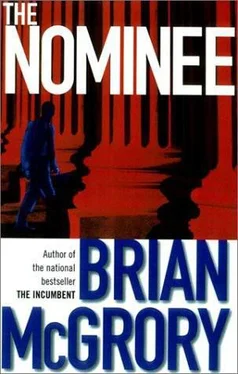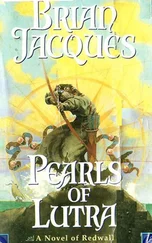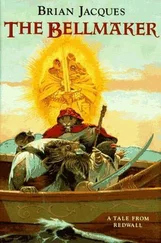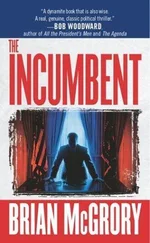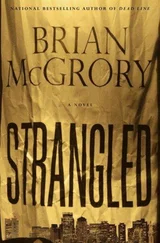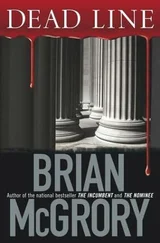He turned around and waved good-bye to the workers. His son, Lance Randolph, the district attorney, suggested they walk back through the school rather than across a dirt-covered construction site. But he didn’t want to get stopped again by every fawning teacher in his path, so he said with a smirk, “Come on, kid. I always said politics was a dirty business. Don’t worry about your damned shoes.”
They walked around a construction trailer in the gentle morning sun, father and son, a political dynasty in the making. As they walked side-by-side, Randolph turned to his son and said, “I’m thinking about running for the Senate next year.” Bill Gowan, the governor’s State Police bodyguard and driver, walked a few paces ahead.
Lance Randolph’s eyes widened. He snapped his neck toward his father and said, “You’ve got a lock on the governorship. Why challenge an incumbent senator?”
“I’ve done this two terms already, son. I don’t know if I have much left I want to do, or for that matter, can do. I’m sick of running every four years. I like the idea of playing on a national stage. And in the Senate, you can collect a thousand dollars at a time in contributions, cutting down on this bullshit fundraising time.”
The two were in the middle of a stretch of hard-packed dirt. Behind them were only construction trailers. To their right was the high, windowless brick wall of the school gymnasium. Straight ahead, about thirty feet away, was the school driveway and their shiny state-issue, navy blue Ford LTD sedan.
Lance Randolph was about to say something when a student walked around a far corner and called out, “Hey, Mr. Randolph.” He was a strange-looking kid, with long, stringy hair. Stranger still was what he wore — a flowing white coat that looked like something he might wear in a science lab.
He repeated himself. “Hey, Mr. Randolph.”
“Damn,” Bertram Randolph said out of the side of his mouth. Ever since he got into this business twenty years before, he found himself constitutionally incapable of ignoring voters, whether they be young or old, black, red, or white, male or female. Some politicians were good at the gentle, dignified blow-off, but not him.
He said to his son, “Come with me for a second. We’ll do this quick.” And he veered toward the funny-looking kid.
They were but fifteen feet away when the young man reached inside the flowing coat and pulled out a short, semiautomatic rifle. Lance Randolph, the district attorney, froze, unable even to get the sounds out of his mouth to form a scream. Bertram Randolph, the governor, stopped, reached his hand out, and said, “Son, what you want to do is to give me that weapon right now before someone gets hurt and you get in big, big trouble. Give me that gun.”
The kid looked at the governor as if he didn’t understand. He then turned slightly to his right, took aim, and fired at Trooper Gowan, who was opening the passenger door of the governor’s car. Gowan crumpled immediately to the ground. He never saw what hit him.
The teenager then calmly turned back toward the father and son. He took a step closer, the gun aimed straight ahead, and said to Lance Randolph, “You sent my friend to jail. Big mistake on your part.”
And with that, Lance Randolph began to run. When he bolted, he was so panicked that he pushed off against his own father and mistakenly knocked him to the ground. The kid fired a long volley of bullets at the district attorney as he ran furiously toward the car, hoping to take refuge behind it. But every shot missed.
The prosecutor reached the car and dove behind the back end. The governor picked himself up slowly from the soft, filthy ground, wiped a smudge of dirt from his right eye, and stared at the young gunman, not wanting to show fear. Thoughts of the Brookline abortion clinic shootings, all the murderous rage that had become too commonplace in America. And here he was, face to face with evil.
“Give me the gun, son. I’m the governor of Massachusetts. If you give me the gun, I can help you out.”
The elder Randolph looked out of the corner of his eye to the Ford resting about thirty feet away, wondering if his son was in the process of helping him, maybe pulling the gun from Gowan’s holster to shoot his way out of this mess. But he didn’t see anything, because there was nothing to see. Lance Randolph hid on the other side of the car, shaking too hard to act.
“Son, I’ll help you, honest to God. But you have to give me the gun.”
The kid gazed back at the governor, his face completely without emotion. His laboratory coat rippled gently in the morning breeze. His hair blew around the bottom of his neck. He took aim.
“No, son. No!”
And he fired.
The first shot slammed into Bertram Randolph’s skull, knocking him back onto the dirt ground. The boy fired a dozen more times, the bullets ripping through the governor’s gray suit and slamming into his flesh and bone with one sickening thud after the next.
The student stopped shooting. He looked curiously at the car and began slowly walking toward it. The district attorney hid behind the rear bumper.
Halfway there, the kid’s face became contorted with a look of incomprehensible despair. He let out an almost inhuman moan, as if the reality of the moment, of his deeds, had just taken hold. He stopped, put the barrel of the rifle against the roof his mouth, and pulled the trigger.
As the boy lay dying on the ground, Lance Randolph emerged from behind the car, first tentatively, then confidently. He sprinted toward his father, dropped to his knees, and held him.
“Oh God, oh God, oh God,” he kept repeating over and over again. He knew his life had changed forever in that one split moment with that one thoughtless reaction. He just wasn’t sure yet how bad.
THE WOODEN STAIRS LEADING up to Robert Fitzgerald’s second story office seemed unusually high, but then again, so did the stakes. Perhaps the latter explained the former. Anyway, when I got to the top, I took a deep breath of the somewhat stale air and walked toward his open door.
Fitzgerald was standing behind his desk, his head down, shuffling through a pile of papers. I knocked once on the door by way of warning and walked inside. He looked up and flashed a bittersweet smile.
“Jack,” he said in that deep, sonorous voice of his. “Jack, I’ve been thinking nonstop of you.” He walked around his desk and shook my hand, placing his other arm gently around my shoulder. It would have been natural to fall into our old pattern, the teacher and his student, but I didn’t because I couldn’t. Calm and confident, those were the keywords, the demeanor that got me through so many interviews before.
“Sit, sit. We have much to catch up on.” I took a seat in my traditional place, a brown leather club chair facing the windows. “How about a glass of port,” he asked. “I’ve got some nice tawny that I think you’ll like. It will soothe things a bit.”
I nodded, figuring that alcohol could only help the situation on either side, emboldening me, loosening him. He poured two glasses and handed me one, then sat on the opposite side of the antique cherry coffee table in his Boston rocker. He wore a handsome spring sport jacket with a light checked pattern, an open-collared blue oxford cloth shirt and a pair of slightly rumpled khakis.
The room, by the way, was lit with low lamps covered in hunter green shades, giving what I’d best describe as a Locke-Ober feel or a Somerset Club mood to the place, familiar, clubby, and refined. A single large blue Oriental rug covered much of the dark, parquet floors.
As we sat, my eyes drifted across all those photographs on his wall of fame — Fitzgerald with Henry Kissinger and John Glenn and Robert Kennedy and even Fidel Castro, not to mention every governor of Massachusetts and mayor of Boston in the last forty years. How many of these people did he lie for? How many of them illicitly benefited from the paper’s blind faith in its star reporter?
Читать дальше
